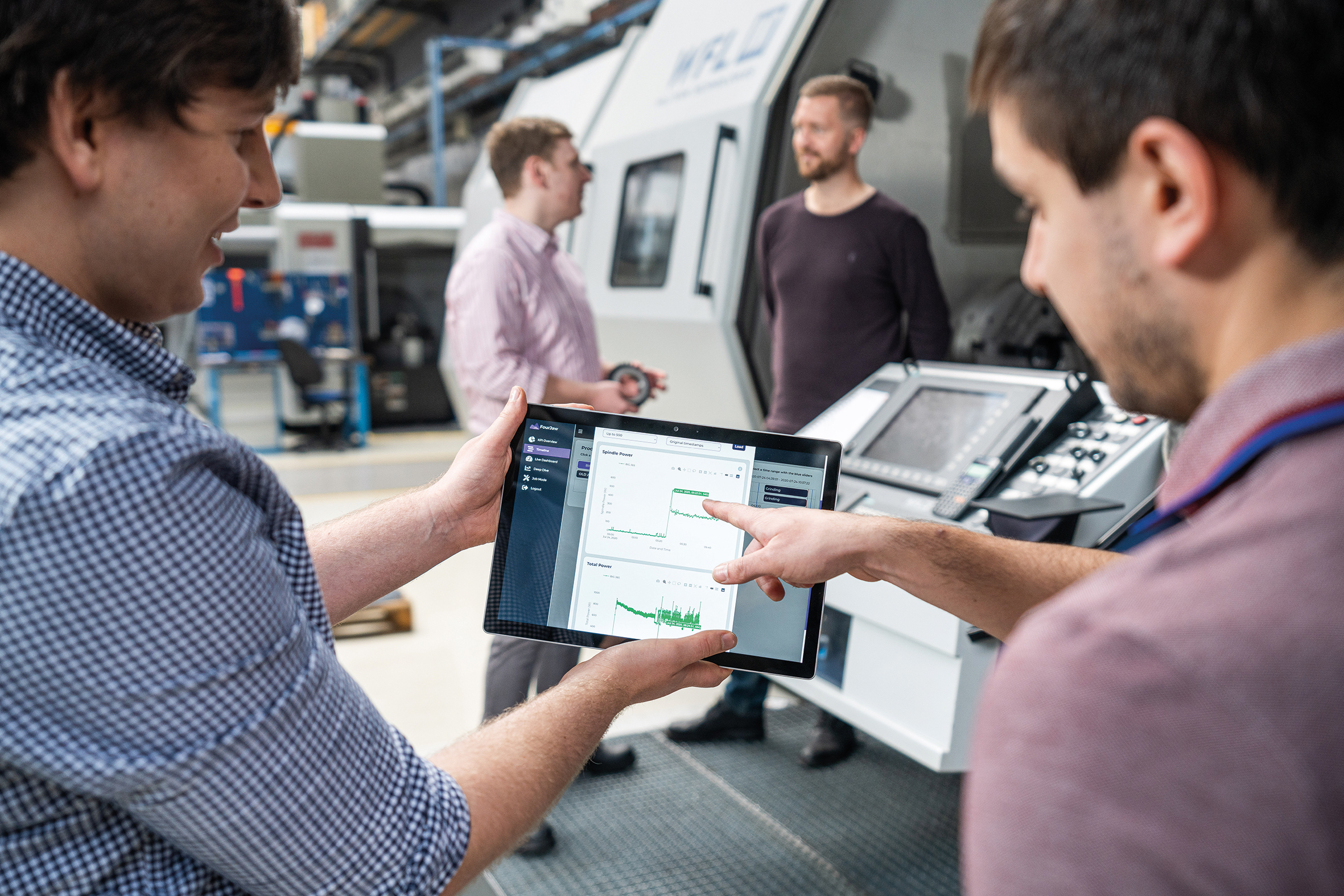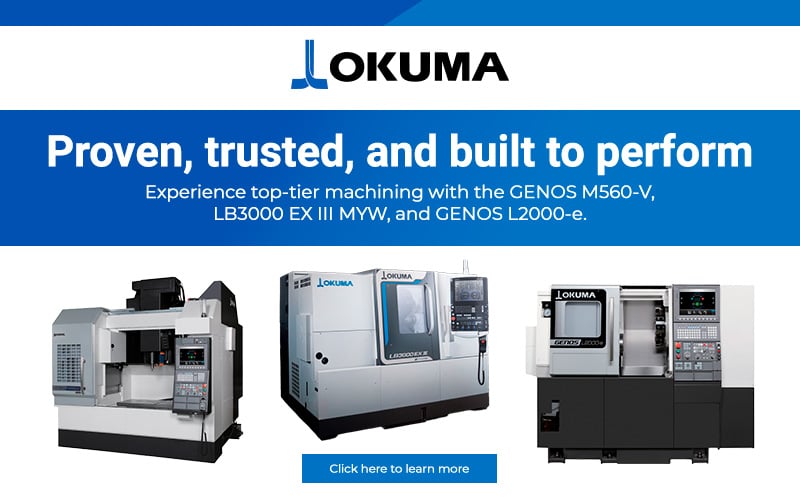
A fitness tracker for UK manufacturers to measure and improve productivity – from the shop floor to the top floor is being tested with Yorkshire companies by a tech start-up that has grown out of the University of Sheffield’s globally recognised Advanced Manufacturing Research Centre (AMRC).
FourJaw Manufacturing Analytics (FourJaw.com) is the brainchild of AMRC Commercialisation Manager Chris Iveson and Machining Project Engineer Robin Hartley. They have developed a new Manufacturing Execution System that can unlock valuable data hidden within machine controllers and converting it to ‘deep insights’ that enable production managers to turbocharge their productivity.
 “We are finding that many manufacturing companies struggle to understand what is happening on the shop floor. It is effectively a black box for them,” says Iveson, who believes FourJaw’s technology will open that box.
“We are finding that many manufacturing companies struggle to understand what is happening on the shop floor. It is effectively a black box for them,” says Iveson, who believes FourJaw’s technology will open that box.
With financial support from the Royal Academy of Engineering, Hartley is now an Enterprise Fellow. From the University of Sheffield’s commercialisation arm, the pair are now taking their technical know-how and building a business around it. “It’s been a lot of hard work, late nights and busy weekends, but this is a massive opportunity to augment the technical excellence of UK manufacturers with the world-beating productivity that modern technology enables,” says Mr Hartley.
What they are talking about is nothing less than a digital transformation, but the FourJaw founders are cautious as the UK manufacturing sector has been bombarded with promises of digital transformation for years. Unfortunately, many of these digital solutions have been overhyped only to under-deliver. This has left manufacturers jaded and believing digital technologies offer little value in a real-world ‘shop floor’ setting.
The pair understand the difficulties of manufacturers, painting a picture of an industry where performance is difficult to measure, competitively pricing jobs is more of an art than a science, and scheduling production is a daily struggle. Even when firms put systems in place and collect data from their machines, Iveson and Hartley find they offer limited value and that firms struggle to turn ‘data’ into actionable information.

They recall recent conversations with manufacturers, where it is common to find average utilisation rates of around 50% across all the machines on the shop floor. “The problem is, that rate is across all machines and it’s really hard to trace the root cause. Is it an individual machine, a troublesome component, unexpected downtime or a production bottleneck? We created FourJaw to give manufacturers these answers and allow them to see what is actually happening on the factory floor,” Hartley says.
FourJaw can do this by getting inside the brains of the machine, the CNC. This is what actuates the motors to achieve the complex geometries needed to make a part. For all but a few firms, the raw data stored inside these brains is so difficult to translate into knowledge, it is simply discarded as a form of digital swarf.
This prompted Hartley to set up a research project to decipher the stored data and turn it into information that could give manufacturers the competitive edge over lower-cost economies. Having achieved this goal, however, Hartley and Iveson were still short of a smart system that manufacturers could simply plugin and play. A system that not only extracts data from the control units, but turns it automatically into insights.
To achieve this, the two entrepreneurs turned to Sheffield-based software engineers, Razor, to perfect a technology that interfaces with, and extracts data from, complex and varied machine tools, before securely sending the data to the cloud for detailed analysis.
“This required some serious thought, a lot of creative thinking and software engineering skill,” says Jamie Hinton, CEO of Razor. “The entire process was agile – properly agile. Our understanding and direction changed regularly, as we were in totally uncharted waters with the problems being faced.”
Focusing in on a subset of the most popular control units, adapters were created that could be remotely installed in the factory and talk to the CNC controllers in their native language/protocols. These adapters extract data, push it securely to the cloud and then process it in a variety of ways, creating insights that are bespoke to the needs of stakeholders at several levels of the manufacturing business.
 During development, iterations of the adapters were installed at the AMRC’s Factory of the Future with live data streaming being processed in real-time. The AMRC’s Deputy Head of Digital, Jon Bray, says: “This is a beautiful example of what can happen when digital meets manufacturing. You can only get this kind of breakthrough when you bring really, really good software guys into close collaboration with really detailed engineering knowledge to interpret what the software is telling you.”
During development, iterations of the adapters were installed at the AMRC’s Factory of the Future with live data streaming being processed in real-time. The AMRC’s Deputy Head of Digital, Jon Bray, says: “This is a beautiful example of what can happen when digital meets manufacturing. You can only get this kind of breakthrough when you bring really, really good software guys into close collaboration with really detailed engineering knowledge to interpret what the software is telling you.”
FourJaw is business of entrepreneurs that wanted to simplify the process further for ease of adoption and usability. They have now teamed up with Sheffield based software development and technology company, The Curve, whose on-demand technical expertise and ‘big data’ know-how is being used to develop an app to present data analytics in a readily digestible format for production managers.
“It’s been great working with another recent start-up, but one with an incredible pedigree,” says Iveson of the firm set up by Paul Ridgway former CTO and co-founder of telematics firm The Floow. Paul Ridgway who is also a software engineering graduate of the University of Sheffield said: “Productivity in the current market is key to the viability of any business, helping free-up resource, lower costs and ultimately beat competitors.”
“The analytical solutions FourJaw are providing are incredibly important and it has been fantastic to help make this accessible to the market.”
The FourJaw business model is ‘software-as-a-service’. A sort of ‘Netflix or Spotify’ for manufacturing execution systems. Instead of paying a huge up-front cost, which is a significant barrier to adoption, particularly for SME’s, and a blocker to FourJaws’ growth, manufacturers pay a much more affordable rental each month for use of the system.
“That means the manufacturer gets continuous updates to the software, seamlessly rolled out from the cloud just as Netflix does for its subscribers,” says Iveson, who sees their affordable product being an invaluable tool for thousands of SME’s. “At the moment, there is a small amount of on-site installation required. The vision is that in the future, the installation will be as simple as sending a purpose-built computer to the customer with all the software fully loaded, which they plug into their shop-floor network enabling us to access the machine data and feed it back as knowledge.”
 Bringing old machines into the digital age
Bringing old machines into the digital age
But what if the manufacturer has old machines with no connectivity, which is not uncommon? Here, too, FourJaw has come up with a solution. By retrofitting a sensor system directly to the CNC machine, Iveson and Hartley can bring even an ancient Bridgeport into the digital age.
While this low-fidelity option does not tap into the rich data source of the CNC controller, with a bit of clever analysis, there is still a lot to be gained using sensor signals. The insights are valuable for driving productivity improvements and providing much-needed visibility for older machines. Despite the different data collection methods, all insights generated by FourJaw are presented in a single unified view of the shop floor, allowing manufacturers to ignore the software technicalities and get on with what they do best, making parts!
Ironically, establishing a start-up in the midst of a global pandemic is less a threat than an opportunity for FourJaw. “We are finding it easier to get to talk to the right people than before, and not having to travel to set up a meeting is a big bonus,” says Iveson. Add to this the fact that the team are working to develop the technology to be installed remotely, and Iveson feels that this could be an ideal opportunity for global medium-sized firms to harness the power of industrial digitalisation.
Iveson continues: “Look around the Sheffield City Region and you will see global leaders in manufacturing whose strength lies in their power to continually innovate.” Think AESSEAL in Rotherham, where Iveson spent his early career or Gripple in Sheffield. Increasingly, we are seeing the emergence of a new breed of software engineer keen to exploit the boundless opportunities that come from working with the grain of the region’s historic manufacturing base.
Jamie Hinton and Paul Ridgway are in the vanguard of the ‘digital meets manufacturing renaissance’, and are seeing the benefits not just for their own businesses but for the wider prosperity of the region. As Hinton says: “You don’t get much better than helping a brand-new business being formed and the first customer created. FourJaw is now in production and receiving some incredible feedback. We are astonishingly proud of being a part of its journey and being instrumental in bringing it to market.”

